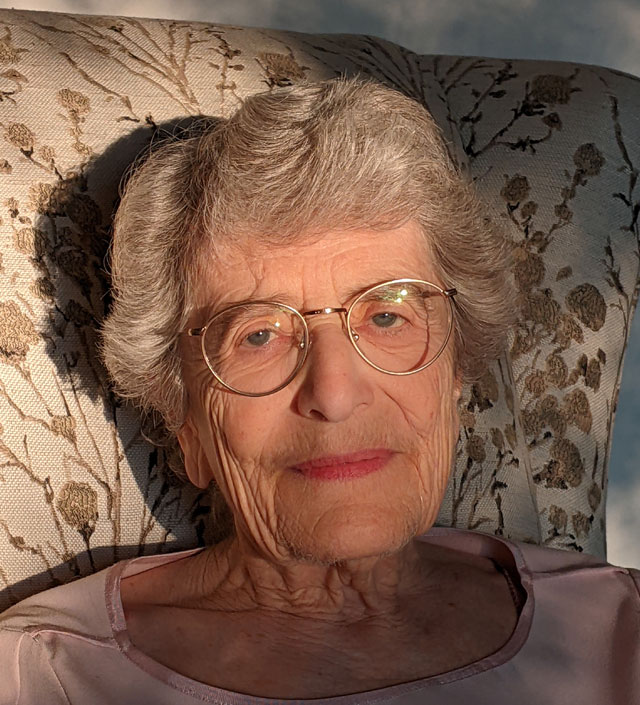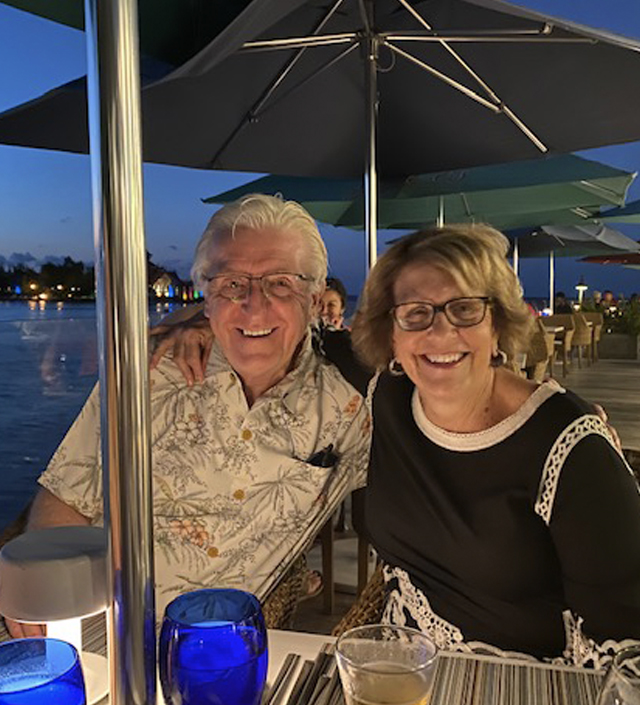Editor’s Note: This article is part of a series Rethinking65 is doing on older advisors who are continuing to work. You may also be interested in reading our article on 82-year-old advisor Dick Wendin. Want to suggest an advisor for the series? Contact Editorial Director Jerilyn Klein.
June A. Schroeder, a registered nurse and CFP, remembers the time, as a young woman, when, facing hundreds of eager listeners, she clung to a speaking lectern for dear life, knees locked, knuckles a ghostly white.
She’s come a long way.
Schroeder, 74, and her longtime business colleague, Tom Wargin, who also has his CFP accreditation, founded the fee-only planning firm, Liberty Financial Group, Inc. (www.lfgwi.com) in 1981. It’s based in the Milwaukee suburb of Elm Grove, Wis.
Schroeder now works about 40 hours a month, or one to two days weekly. When we recently spoke, in the heat of tax season, she was putting in longer hours again because her boss, Shannon Nook, the firm’s CEO, was out ill.
“I trained my boss to be my boss,’’ Schroeder puns about Nook, who joined Liberty Financial Group as a high school intern and, much like Schroeder, who was a high school math whiz, worked her way up. Wargin’s son, David Wargin, is vice president of technology research and practice management.
Schroder’s long list of accomplishments includes earning a nursing degree from the University of Wisconsin-Milwaukee in 1969, which, bolstered by her advanced math skills, led to her becoming director of economic security for the statewide Wisconsin Nurses Association. While serving in this role, she took a seminar on financial planning, which led to her “aha’’ moment.
“Years later, when I was taking the seminar on financial planning, I thought about my mom’s predicament and realized how much unhealthy stress is caused by lack of financial knowledge.”
“My mother was my best friend. After my dad died, I needed her to write a check for nursing school enrollment but she didn’t know how to write out a check! I never forgot my mother’s embarrassment,” says Schroeder.
“Years later, when I was taking the seminar on financial planning, I thought about my mom’s predicament and realized how much unhealthy stress is caused by lack of financial knowledge.”
There was also the memory of needing a man’s signature to buy her first house, in 1971. By age 25, Schroeder had been an RN in the neurology/neurosurgery departments at the Milwaukee Veterans Administration Medical Center and was a supervisor at a Milwaukee nursing home.
But she couldn’t buy a house on her own steam.
“My boss at the nursing home, who helped me get the supervisor job because he saw leadership qualities in me, helped me buy the house,” says Schroeder.” He signed for me at the bank and even negotiated a better interest rate. That was a big lesson for me.”
She put that lesson into practice by accepting an offer to be the financial representative for the Wisconsin nurses association that she belonged to.
“So here I was, director of economic security, and technically, I had no idea what it was all about; I was over my head,” says Schroeder. “It included negotiating labor contracts. Well, I wasn’t part of a union family, and I had no family money. But, I had learned how to work hard from my mother.’’
Another “aha moment’’ happened when Schroeder took a look around the room at her negotiating colleagues.
“I made this stunning discovery: I am running this program that I learned about by my bootstraps and I’m negotiating contracts with lawyers and representatives of counties and cities!” she says. “Just imagine, here I am doing this job, that I had to learn all by myself. Once you do that, I think you can do anything. I was intimidated at first, but I got over it!’’
That’s what happened at the lectern that day long ago. Seeing herself as an accidental but enthusiastic trailblazer, Schroeder had agreed to be a speaker at the annual American Nurses Association convention in San Francisco. “I grabbed onto that podium and my knuckles were white and I locked my knees so they wouldn’t shake,’’ she remembers.
While traveling to that convention, she also chatted with her seatmate on the plane, the CEO of a Milwaukee company, about her thoughts on a career in finance. He suggested that she read the Wall Street Journal and buy a briefcase. The next week, a new briefcase arrived at her home from the CEO. She kept in touch with him for years.
It wasn’t a big leap for Schroeder to go from representing the overwhelmingly female nurses association members, who often were unaware of their benefits and rights, to deciding she wanted to help women gain financial independence.
Still working as a nurse, she earned her license to sell insurance, on commission. She met Wargin at a financial planning seminar and then, sharing values and interests with him, she went to work for his employer, an insurance company.
But neither liked what Schroeder called “wiggling your way around to convince people they needed to buy insurance.’’ With two other colleagues, Schroeder and Wargin met in her living room in December 1980 to discuss starting a business that would focus on clients’ needs and financial planning.
The other two dropped out, but “Tom and I decided to continue with our calling!” says Schroeder. “We felt the people who really needed help were women, so we called it Women’s Financial services, which evolved into Liberty Financial Group.’’
Schroeder found clients by speaking to groups of nurses and by writing articles for and advertising in newsletters and journals for nurses. She also taught financial planning classes at the Milwaukee Veterans Administration Medical Center.
“You gotta figure out who is going to listen to you and stay within your lane. People heard about these classes and they trusted me,” said Schroeder. “You know, nurses are among the most trusted groups in the country.’’
Schroeder, who continues to retain her nursing license, says her forte has been “financial planning road maps” — which roads clients should take and what they are willing to give up to get there.
“Tom loved investments and analysis. I was the rainmaker and the planner and I loved running the numbers on cash flow management, planning, bottom-line stuff. Tom did the balancing and analysis, and he is an avid reader, so he would help me keep up,” she says. “The client was the center of everything we did; we knew each and every one, even at our largest number of clients, which was about 250.’’
Liberty Financial Group now manages portfolios for about 150 clients, says Schroeder.
“We never were big. The most we had on staff here was seven. We didn’t want to have more offices. We wanted to stay focused and we also wanted a life!” says Schroeder. “We both were offered jobs at large companies along the way, at banks and investment houses, because we were on TV and in the papers and I had my own radio show, ‘Today’s Woman,’ about how to make good choices in life.’’
Schroeder has been married for 30 years to Mike McCormick, a former Army helicopter pilot who served in Vietnam. It’s her second marriage.
“I had health issues when I was a young woman and that was a factor in not having children, but I always said that my career was my kid,” says Schroeder.
“My husband has been completely supportive of everything. I was also working as a nurse to build the business in the 1980s. I was a supervisor at a nursing home in Milwaukee doing 12-hour shifts on Saturday and Sunday. My husband asked “Could I stay home on weekends; your business is doing okay, stay here,’ but I hated leaving nursing!’’
She holds a nursing license to keep connected to the field and to the many nurses she knows — some of them have been her clients. Keeping her license has also been helpful with her husband, 73, who has had heart disease. If he needs medical assistance, Schroeder says she will have the authorization to provide it.
Schroeder says she never planned to retire at the conventional age of 65, and has always told her clients, “I will work until 80 or until I no longer get the correct answer on the calculator.”
Still, her clients, some of whom have been with her since 1981 or 1982, have started saying, “When are you retiring?” “I am a little afraid that you are going to retire” and “June, you’re getting older,” she says.
“Tom [Wargin] and I needed to make sure our clients were taken care of, so we have been grooming new people, especially for those clients who are tied to us by the umbilical cord,” she says. “The younger staff has brought in new, younger clients and some of their parents have been our clients.’’
On training her successor, Shannon Nook, Schroeder was typically forthcoming.
“Shannon went through her growth spurt of being a teen growing up as I was going through menopause, so we fought like cats and dogs,” says Schroeder. “She is, in a sense, my kid, and so she pissed me off; but we made it through that and now we love each other.’’
Schroeder and Wargin wrote a letter to their clients describing what route the firm would take as they, the principals, grew older and scaled back their hours.
“In reality, we as planners need to plan for the older selves that we are going to become,” she says. “Remember, as a nurse and a human being, you know this will change, you will get older, have some issues, at least arthritis, back problems.’’
Schroeder started reducing her schedule by 50%, then by 60%, and is now at about 25% of her former schedule. “But I keep meeting with the clients; I just reduced the management/office issues time,” she says. “Tom kept working on allocation and structuring portfolios, and he kept working full-time longer than I did. We decided not to divest ourselves at the same time.’’
To make their lives easier as they grew older, Schroeder and her husband moved to a two-bedroom ranch house in a continuing care community about 40 miles northwest of her Elm Grove office.
“We had an older house with a wonderful yard, bird feeders, ponds, lots of woods,” she says, but neither she nor her husband could keep up with it and were paying other people to do the work. When they had the opportunity to move to their new community, she wrote about it in a newsletter blast.
“Shannon said I set the stage for older clients to do this and now they all come in and ask, “Where should we move?’ I feel really good about that,’’ says Schroeder.
She and her husband spend summers at a Mount Morris lake cottage with their dog, Fritz, who she says is an “oops’’ breed (born to a wire-haired dachshund and a basset). “ So he is both and one of a kind. He always makes me laugh!’’ she says.
Liberty Financial Group‘s younger clients have found the firm through referrals, website visits or from Schroeder’s writings over the years. “They like our philosophy and that we are fee-only,” she says. “I did not feel comfortable with the thrill of the chase [of commissions]. I don’t know where that feeling came from — maybe from being a nurse.”
As a woman, Schroeder was in the minority when she began in financial management 40 years ago and the numbers haven’t changed much since. Women make up 23% of CFP® holders, a similar percentage to the advisor population. She sees that changing.
“The advent of girls getting more involved in electronics and science and math is a really good thing for the future of the industry itself,” she says.
“My love and desire has always been to help people and to crunch numbers,” says Schroeder, who also volunteers for the Humane Society, sings in her church choir and sits on the board of a local children’s theater group. “I think the change to fee-only fits women better. Most women that I know have a natural desire to do some kind of caregiving. For me, it’s financial planning.’’
In a four-decade career in journalism, Eleanor O’Sullivan has reviewed many books on best practices for financial advisors, has written for Financial Advisor and the USA Today network, and was movie critic for the Asbury Park Press.







